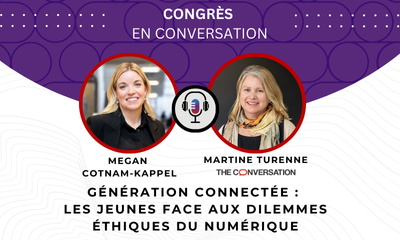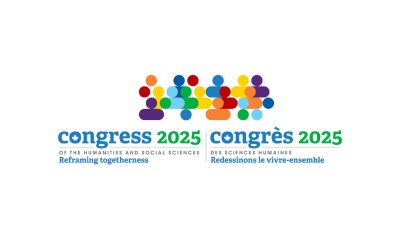REGINA, May 30, 2018 – Researchers examine the carbon footprints of Academia, misunderstandings of carbon pricing and Canada’s contribution to the Paris Agreement, all as part of the Congress of the Humanities and Social Sciences. Canada’s largest academic gathering, Congress brings over 5,000 of the country’s brightest researchers, thinkers, and policy-makers to the University of Regina this week.
Unique to Canada and often called the “Academic Olympics,” Congress is great fodder for journalists looking for fresh research stories in the humanities and social sciences.
All of these researchers are on the University of Regina campus this week.
Highlights in research in environmental issues include:
The Problem of Academia’s Carbon Footprint: The session will address how universities and scholarly organizations can adopt new low carbon technologies and policies, and highlight criteria and other ways to help scholars flourish in their careers while using only their fair share of carbon.
Burn the Money on the Steps of the Legislature: Misunderstanding / Misrepresenting Carbon Pricing in Saskatchewan: Discussions of carbon pricing by the province have been decidedly one‐sided, focusing on the cost of paying a carbon price, while ignoring that revenues could be used to reduce income taxes or provide rebates to vulnerable groups. Brett Dolter of the U of R will present his research on the dominant and alternative perspectives.
Canada's Nationally Determined Contribution to the Paris Agreement: What is Fair and What is Fair Share? In Canada, climate action plans vary considerably across the country. Ontario and Quebec have implemented economy‐wide emissions trading systems. In contrast, Saskatchewan is actively opposed to carbon pricing and does not have defined emissions reduction targets. If the core objective of the Paris Agreement is to be achieved, Canada, along with most countries, must increase the level of ambition to curtail future emissions.
From waste to wealth: Managing wastes for sustainability generates wealth in return. When recyclables and reusables are thrown out, “we waste waste” which would have helped to produce wealth in other areas of the economy. The unthoughtful disposal of wastes in our homes and municipalities also leads to environmental pollution. Countries like China and Sweden can offer lessons for Canada on dealing with abundant waste production.
Congress is an annual gathering of more than 65 scholarly associations, each holding their annual conference under one umbrella. This year’s theme is “Gathering Diversities”, reflecting the history of Regina as a traditional place of gathering and rich buffalo hunting grounds for Plains cultures.
Congress is open to the public. More information about the Federation and Congress 2018 is available online through their website, Twitter and Facebook.
-30-
For interview requests
Federation for the Humanities and Social Sciences
Nicola Katz
Manager of Communications
nkatz@ideas-idees.ca
Cell: 613-282-3489
University of Regina
Dale Johnson
Communications Strategist
dale.johnson@uregina.ca
Cell: 306-531-5995
About the Congress of the Humanities and Social Sciences
Organized by the Federation for the Humanities and Social Sciences, Congress is the largest interdisciplinary conference in Canada, and one of the largest in the world. Now in its 87th year, Congress brings together academic associations that represent a rich spectrum of disciplines in the humanities and social sciences, including literature, history, theatre, film studies, education, music, sociology, geography, social work and many others. Congress 2018 is hosted by the University of Regina. For more information, visit www.congress2018.ca.
About the Federation for the Humanities and Social Sciences
The Federation for the Humanities and Social Sciences promotes research and teaching for the advancement of an inclusive, democratic and prosperous society. With a membership now comprising over 160 universities, colleges and scholarly associations, the Federation represents a diverse community of 91,000 researchers and graduate students across Canada. The Federation organizes Canada’s largest academic gathering, the annual Congress of the Humanities and Social Sciences. For more information about the Federation, visit www.ideas-idees.ca.
About the University of Regina
The University of Regina is constantly pushing the bounds of knowledge and pioneering new ways of thinking about the world. It’s no surprise that the University is ranked in the Top 200 by Times Higher Education in the Best Young Universities category. At the heart of its success is the institution’s commitment to growing diversity. Since 2009, it has increased its international student population by 122 percent and its Indigenous student population by 84 percent. The University of Regina is home to the country’s highest percentage of graduate students from outside Canada, and has received the top ranking in Canada for its number of international research collaborations. For more information about the University of Regina, visit www.uregina.ca.

Génération connectée : les jeunes face aux dilemmes éthiques du numérique
← Page d'accueil du balado Voir Grand Prochain épisode → Introduction | À propos de l'invitée | La recherche de Megan Cotnam-Kappel au Congrès | Transcription | Suivez nous Introduction Bienvenue au Congrès en conversation, une série spéciale...

Fierté et profit : la politique de la solidarité des entreprises
← Page d'accueil du balado Voir Grand Prochain épisode → Introduction | À propos de l'invité | La recherche de Daniel Conway au Congrès | Transcription | Suivez nous Introduction Bienvenue au Congrès en conversation, une série spéciale présentée...

